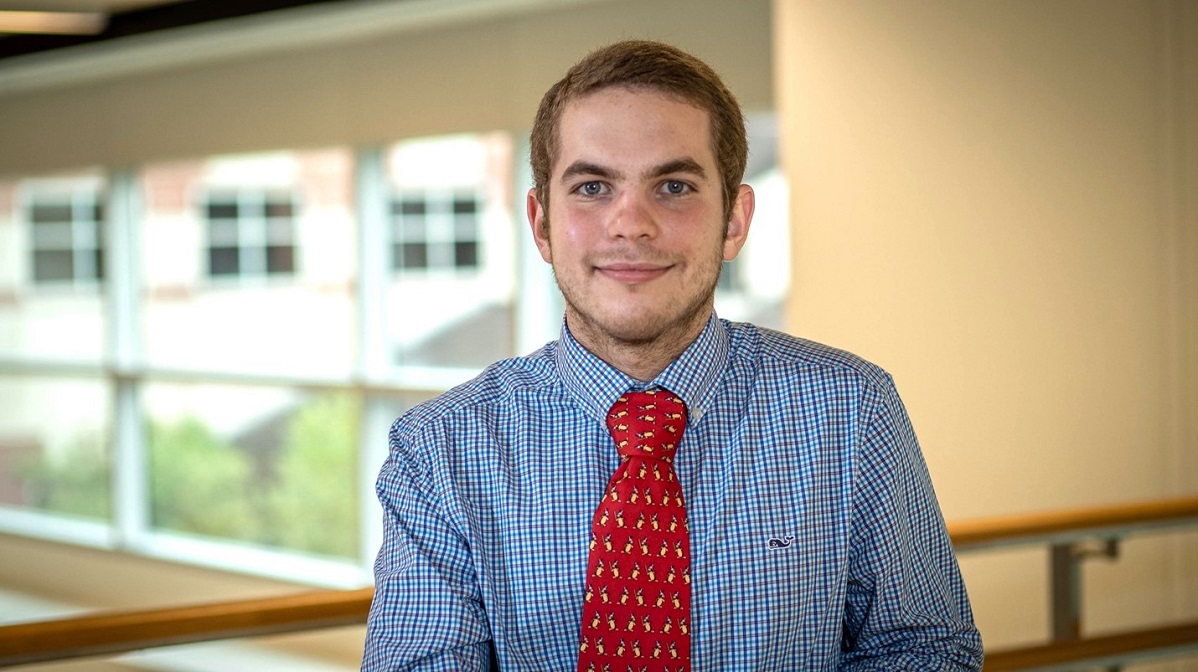
Finding the expected through the unexpected: a closer look at multidisciplinary clinical research
15 July 2022
Sometimes it is difficult to know where life will take you. Anyone alive for long knows very well the natural-yet-contradictory feelings of excitement and apprehensiveness that come with the inherent uncertainty of life. I personally felt this way for most of my freshman year at the University of Delaware. As someone passionate about the biological sciences and interested in people’s health, I knew that there were plenty of exciting opportunities for me to explore and be a part of. At the same time though, I could not avoid feeling behind and inexperienced. My first year at UD I had the opportunity to meet many kinds of people from all grades and majors through my classes and extracurricular activities. Through my interactions, I sensed that everyone was working on something about which they were passionate: doing research on campus, working as teacher assistants, or working as lab preceptors.
With that in mind, I entered sophomore year with the goal of getting involved with something in which I was passionate, something that could become “my thing”. That meant not only finding an experience where I could learn about science but finding an experience to help me grow as a student and as a person. My goal was not only to gain experience in science, but to also learn more about the world and how to make some sort of contribution. After searching the internet, looking at research internships both at UD and other institutions across the country, I could feel time closing in on me. I was concerned about how competitive an applicant I would be to programs that stressed experience and academic excellence. Ultimately, despite all my efforts in trying to find something useful to do over the summer, the experience that ultimately changed my undergraduate experience came unexpectedly in the form of a mass email.
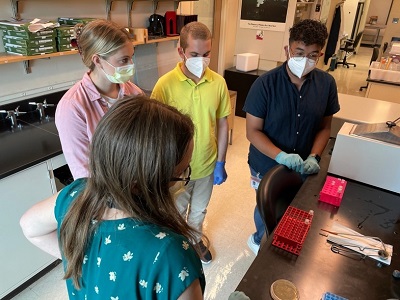 One morning, as I was waiting for my organic chemistry lecture to start, I checked my inbox when I noticed that I had received the Career Center’s monthly community update for those in health science-related fields. It seemed like any other email. The heading was inviting students to apply for work-study opportunities, and it contained regular reminders about upcoming career fairs. Despite being convinced that it lacked any information that would be new to me at the moment, I kept scrolling, and at the bottom I found a small note inviting students to attend a discovery day at the Fox Chase Cancer Center (FCCC) in Philadelphia. I, never having heard of FCCC before, felt curious about what they did and decided to sign up to learn more. Once there, Dr. Amanda Purdy and Dr. Alyssa Leystra introduced me, and the other 10 students that were with me on the discovery trip, to the FCCC-UD Fellowship and gave us an overview of the groundbreaking work being done at the center. After that, I went to a lab where I shadowed a scientist and was introduced to the theory behind the experiments that we had just completed. The most important thing that I recall about the experience, which ultimately led me to apply, was the collaborative and supportive environment that I sensed among all graduate students, personal investigators, and staff. They explained how community was an important part of Fox Chase and they were all very committed to letting students in the fellowship learn as much as possible about everything. They answered all our questions and encouraged us to ask even more about both their research and the program to which we were applying.
One morning, as I was waiting for my organic chemistry lecture to start, I checked my inbox when I noticed that I had received the Career Center’s monthly community update for those in health science-related fields. It seemed like any other email. The heading was inviting students to apply for work-study opportunities, and it contained regular reminders about upcoming career fairs. Despite being convinced that it lacked any information that would be new to me at the moment, I kept scrolling, and at the bottom I found a small note inviting students to attend a discovery day at the Fox Chase Cancer Center (FCCC) in Philadelphia. I, never having heard of FCCC before, felt curious about what they did and decided to sign up to learn more. Once there, Dr. Amanda Purdy and Dr. Alyssa Leystra introduced me, and the other 10 students that were with me on the discovery trip, to the FCCC-UD Fellowship and gave us an overview of the groundbreaking work being done at the center. After that, I went to a lab where I shadowed a scientist and was introduced to the theory behind the experiments that we had just completed. The most important thing that I recall about the experience, which ultimately led me to apply, was the collaborative and supportive environment that I sensed among all graduate students, personal investigators, and staff. They explained how community was an important part of Fox Chase and they were all very committed to letting students in the fellowship learn as much as possible about everything. They answered all our questions and encouraged us to ask even more about both their research and the program to which we were applying.
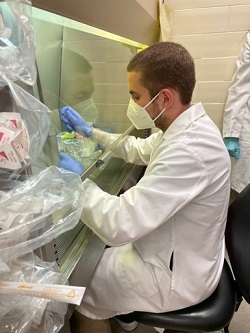 At the very beginning of the fellowship, during the first week of June, I met the three other students I would spend the rest of the summer with. I was happy to learn that they were all very friendly and motivated to learn as much as they could, just like me. During that same week we completed an intensive training called “Foundations in Cancer Research'' dedicated to give everyone, regardless of experience, the tools necessary to successfully conduct molecular biology research. During five short days, I gained the experience I was yearning to gain the entire time I was looking for research opportunities during the previous fall. I learned how to perform serial dilutions, how to recover plasmid through bacterial cell colonies, and how to prepare and read the genetic material in a gel. In addition to that, we also learned how to dissect scientific journal articles and gained insight into the process of scientific writing.
At the very beginning of the fellowship, during the first week of June, I met the three other students I would spend the rest of the summer with. I was happy to learn that they were all very friendly and motivated to learn as much as they could, just like me. During that same week we completed an intensive training called “Foundations in Cancer Research'' dedicated to give everyone, regardless of experience, the tools necessary to successfully conduct molecular biology research. During five short days, I gained the experience I was yearning to gain the entire time I was looking for research opportunities during the previous fall. I learned how to perform serial dilutions, how to recover plasmid through bacterial cell colonies, and how to prepare and read the genetic material in a gel. In addition to that, we also learned how to dissect scientific journal articles and gained insight into the process of scientific writing.
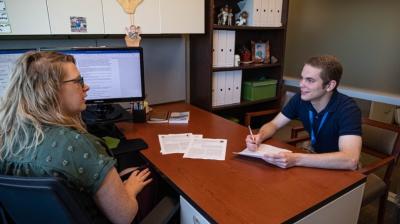 After that first week, I was introduced to my research group. As a research assistant at the Cancer Prevention and Control Department, I work under the supervision of Dr. Erin Tagai, PhD, MPH. In her lab, we research the different environmental and demographic factors (such as race, education, income, and access to resources) that influence low-risk prostate cancer patients in their selection of treatment among the different options that are available to them (radiation therapy, radical prostatectomy, and active surveillance.) In her lab, my role is to transcribe patient interviews and recruit eligible patients using EPIC, a software that healthcare professionals use to access and house patients’ clinical records. Later in the summer, I will get to attend clinics around the Temple University Hospital system to recruit patients in person, and I will also get to interview them.
After that first week, I was introduced to my research group. As a research assistant at the Cancer Prevention and Control Department, I work under the supervision of Dr. Erin Tagai, PhD, MPH. In her lab, we research the different environmental and demographic factors (such as race, education, income, and access to resources) that influence low-risk prostate cancer patients in their selection of treatment among the different options that are available to them (radiation therapy, radical prostatectomy, and active surveillance.) In her lab, my role is to transcribe patient interviews and recruit eligible patients using EPIC, a software that healthcare professionals use to access and house patients’ clinical records. Later in the summer, I will get to attend clinics around the Temple University Hospital system to recruit patients in person, and I will also get to interview them.
As someone who wants to go to medical school, this opportunity has been absolutely eye opening. Besides working alongside medical students and being able to experience patient care from a research standpoint, my experience at Fox Chase has opened my eyes to how multidisciplinary medicine and research can truly be. It also gave me insight into the fascinating world of public health, a discipline that I was previously not aware of and did not know I would find so interesting. Many experts agree that the best way to protect patients from cancer is to help them avoid it in the first place. At the department where I work, I am motivated by all the effort that is placed into searching day and night for those factors that can predispose certain populations to certain types of cancer, and the effort that is invested into trying to address them. The few weeks I have been working at the Prevention department have convinced me to obtain an MPH in addition to my MD degree in the future.
The end is only the beginning: looking back and looking forward to what comes next
22 August 2022
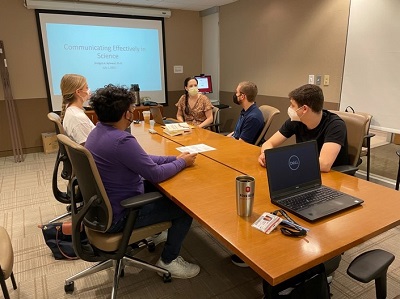 When starting the fellowship ten weeks ago, I expected that this opportunity would challenge me intellectually in a way that no other summer experience could. Being the first time that I collaborated in a research lab, I knew challenges would present themselves in a way that would test my reasoning skills, my determination, and my perseverance. Now, the summer is almost over, I feel encouraged to see all the personal and professional growth I have undergone throughout my time here.
When starting the fellowship ten weeks ago, I expected that this opportunity would challenge me intellectually in a way that no other summer experience could. Being the first time that I collaborated in a research lab, I knew challenges would present themselves in a way that would test my reasoning skills, my determination, and my perseverance. Now, the summer is almost over, I feel encouraged to see all the personal and professional growth I have undergone throughout my time here.
Working in Dr. Erin Tagai’s laboratory was a rewarding experience that allowed me to discover the fascinating world of public health and population research. With her guidance, I carried out a qualitative study that examined the decision-making process of low-risk prostate cancer patients seeking treatment for their diagnosis. The goal was to determine the different environmental variables that influence people to choose active surveillance vs. radiation vs. surgery. It also had the goal of better understanding how structural barriers affect people’s treatment decisions and the inequities that exist between White and African American prostate cancer patients that might contribute to disparities in outcomes.
This project was very special to me because I had the opportunity to help on every step of the process. Since our work consisted of interviewing many human subjects, and every participant was at a different stage of the study, my days were very dynamic. I always had many different tasks to do, and lots of different people with whom to interact. Throughout my time at Fox Chase, I learned the ins and outs of reviewing electronic health records, reading biopsy reports, recruiting patients, and interviewing them, transcribing audio interviews, and analyzing those transcripts for data analysis.
As soon as I started working with patients, I quickly understood how different this research would be compared to any previous experience I had gained as a biology major. Unlike petri dishes or western blots, the human mind cannot be photographed under a microscope or examined using spectroscopy to produce standardized results. Humans do not always mean what they say and they do not always share everything that one wishes to know. That is the reason why analyzing the interviews was my favorite task. Since it required meticulous attention to detail and lots of reading between the lines, I grew to appreciate how challenging it was.
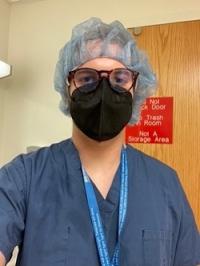 Outside the lab, I had the privilege of observing how doctors delivered healthcare to patients. I did so by shadowing several specialties such as palliative care with Drs. Dylan Sherry and Marcin Chwistek, thoracic surgery with Dr. Stacy Su, and hospital medicine with Dr. Elizabeth Bourne. These shadowing experiences allowed me to see firsthand how clinical research is critical in improving the treatment of cancer. I witnessed the wide variety of new drugs and therapies available, and the advances brought by the DAVINCI machine in minimally-invasive thoracic surgeries. More relevant to my research, I listened as doctors discussed with patients and their families the different options available at their disposal, and I saw patients make decisions about their treatment in a way that brought my research to life in a way that I found fascinating.
Outside the lab, I had the privilege of observing how doctors delivered healthcare to patients. I did so by shadowing several specialties such as palliative care with Drs. Dylan Sherry and Marcin Chwistek, thoracic surgery with Dr. Stacy Su, and hospital medicine with Dr. Elizabeth Bourne. These shadowing experiences allowed me to see firsthand how clinical research is critical in improving the treatment of cancer. I witnessed the wide variety of new drugs and therapies available, and the advances brought by the DAVINCI machine in minimally-invasive thoracic surgeries. More relevant to my research, I listened as doctors discussed with patients and their families the different options available at their disposal, and I saw patients make decisions about their treatment in a way that brought my research to life in a way that I found fascinating.
T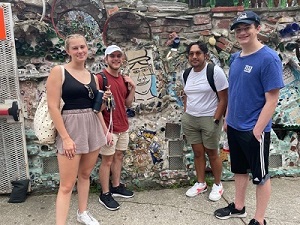 here are many things that I feel grateful for, but perhaps I am most grateful about all the wonderful people I have met. I applied to Fox Chase because of the people, and I was not wrong. Everyone was very passionate and committed about what they did, and I loved how they tried to pass their enthusiasm onto me. I leave more committed than ever in pursuing a career in medicine and whether I end up earning an MD, an MD/PhD, or an MD/MPH, I cannot wait to see what the future holds!
here are many things that I feel grateful for, but perhaps I am most grateful about all the wonderful people I have met. I applied to Fox Chase because of the people, and I was not wrong. Everyone was very passionate and committed about what they did, and I loved how they tried to pass their enthusiasm onto me. I leave more committed than ever in pursuing a career in medicine and whether I end up earning an MD, an MD/PhD, or an MD/MPH, I cannot wait to see what the future holds!